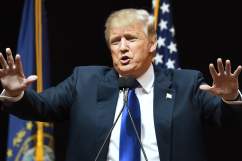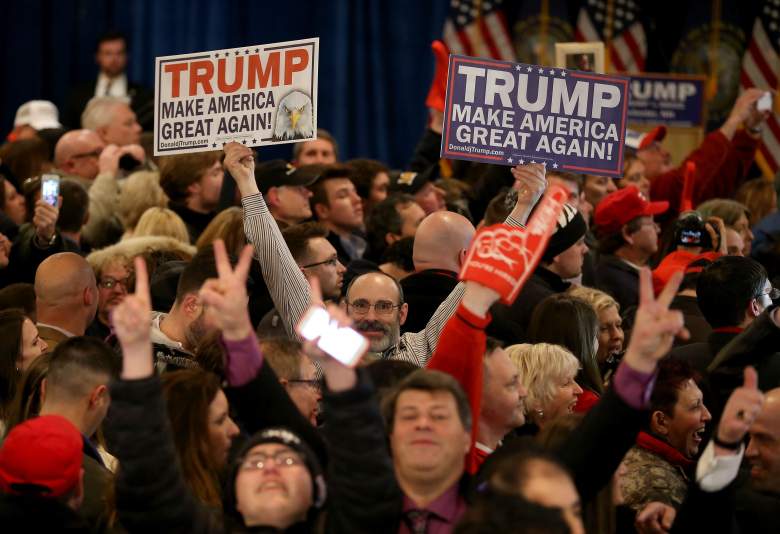
Donald Trump’s supporters celebrated the candidate’s win Tuesday in New Hampshire. They’ll hope to do the same February 20 in South Carolina. (Getty)
The South Carolina GOP presidential primary is set for Saturday, February 20, 2016. With the New Hampshire primary in the rearview mirror, attention will shift to the Palmetto State, whose “First in the South” primary is next up on the GOP primary schedule. After South Carolina, the GOP campaign moves to Nevada, which holds its caucus on Tuesday, February 23.
South Carolina and Nevada vote in the opposite order for the Democrats, whose Nevada caucus is February 20 and whose South Carolina primary is February 27.
There are 50 delegates up for grabs in South Carolina — nearly as many as Iowa (30 delegates) and New Hampshire (23) combined. And unlike Iowa and New Hampshire, which award delegates proportionately based on their vote totals, South Carolina awards its delegates through a hybrid “winner take all” system: Winning the state-wide race gets a candidate at least 29 of the state’s 50 delegates. The other 21 delegates are determined by the winner in each of the state’s seven congressional districts. (Frontloading HQ has a good explainer on how the delegate allocation works.)
South Carolina’s primary is a traditional election in which polls are open throughout the day and voters cast secret ballots. Primaries are structured differently than caucuses, which take place at a set time and have complex rules that differ by party.
The GOP delegate standings heading into the South Carolina primary are as follows:
| CANDIDATE | DELEGATES |
| Donald Trump | 17 |
| Ted Cruz | 11 |
| Marco Rubio | 10 |
| John Kasich | 5 |
| Jeb Bush | 4 |
| Ben Carson | 3 |
Read on for some additional background and context on the “First in the South” primary.
1. There Are 6 Candidates in the South Carolina Race; Donald Trump is the Frontrunner
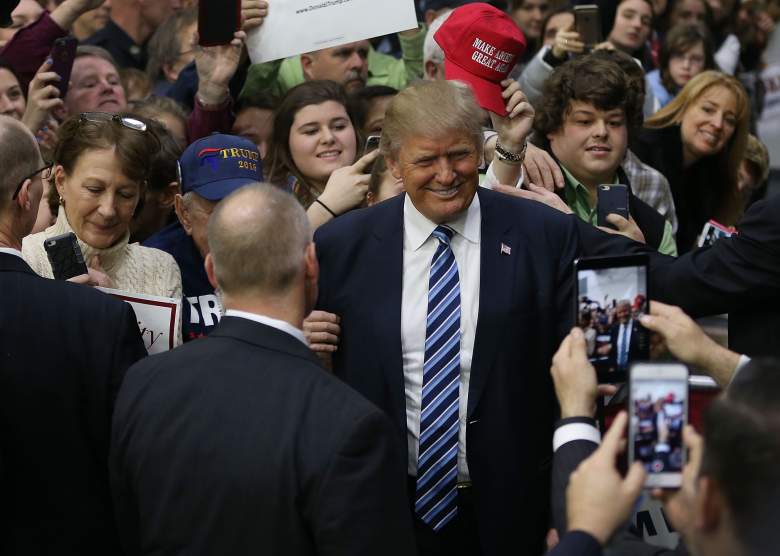
Donald Trump, shown here campaigning in New Hampshire on February 7, has led virtually every South Carolina primary poll for the past six months. (Getty)
The following candidates are contending in South Carolina.
- Jeb Bush
- Ben Carson
- Ted Cruz
- John Kasich
- Marco Rubio
- Donald Trump
Below is a rundown of South Carolina polling averages via RealClear Politics. The polls featured in the average were conducted between January 17 and January 23.
| CANDIDATE | POLLING AVERAGE |
| Donald Trump | 36% |
| Ted Cruz | 19.7% |
| Marco Rubio | 12.7% |
| Jeb Bush | 10% |
| Ben Carson | 8.7% |
| Chris Christie | 2.3% |
2. Chris Christie, Carly Fiorina & Jim Gilmore All Dropped Out of the Race After New Hampshire
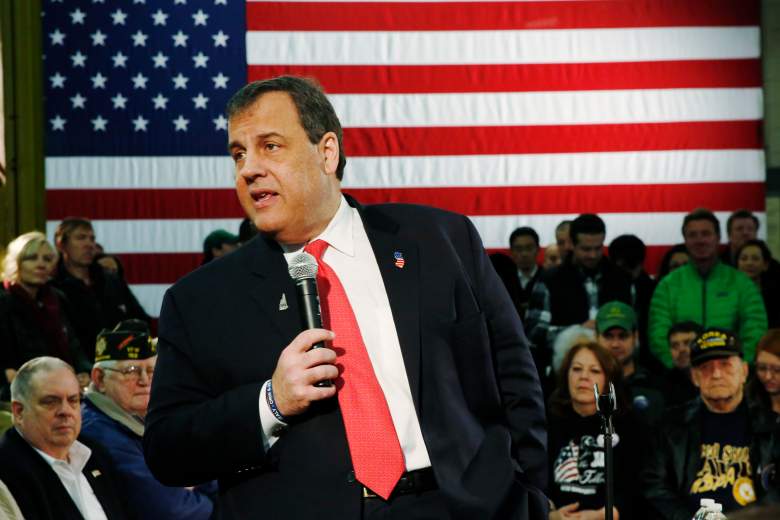
Chris Christie, speaking at a town hall meeting February 8, could drop out of the race if he doesn’t exceed expectations in New Hampshire. (Getty)
The GOP primary field shrunk from nine candidates to six after the New Hampshire primary, when Chris Christie, Carly Fiorina and Jim Gilmore all dropped out. It came as no surprise that the field got smaller. If anything, the only surprise was that Christie, Fiorina and Gilmore didn’t have company.
Heading into New Hampshire, only three candidates were virtual shoo-ins to complete in South Carolina: Donald Trump, Ted Cruz and Marco Rubio.
Jeb Bush, John Kasich and Chris Christie had all staked their entire campaigns on a strong finish in New Hampshire, putting the lion’s share of their resources there and spending much less energy trying to compete in Iowa. None of the three finished in the top 5 in Iowa, and the three received a combined 6.5 percent of the vote.
But Kasich, who finished second in New Hampshire, has vowed to stay in the race. Bush, who’s jockeying for third place and has the money needed to run a long campaign, has also said he’ll go to South Carolina. Christie, though, finished sixth in New Hampshire and announced afterward that he was heading back to New Jersey to think things over rather than heading to South Carolina. He announced the following day that he was dropping out of the race.
3. In 5 of the Last 6 Elections, the Winner of the South Carolina Primary Went on to Win the GOP Nomination

George W. Bush and his wife, Laura, celebrate after winning the South Carolina primary in 2000. Bush was the third straight South Carolina winner to go on to win the GOP nomination. (Getty)
From 1980 through 2008, every candidate who won the South Carolina GOP primary went on to win the party’s nomination: Ronald Reagan in 1980; George H.W. Bush in 1988; Bob Dole in 1996; George W. Bush in 2000; and John McCain in 2008. The streak came to an end in 2012, when Newt Gingrich won the primary and eventual nominee Mitt Romney finished a distant second.
Analysts credit Bush’s victory over McCain in the 2000 South Carolina primary with propelling the Texas governor to the nomination.
McCain had beaten Bush by 18 percentage points in New Hampshire on February 1, 2000. Bush rebounded with a 25-point win in Delaware on February 8, setting up a showdown in South Carolina that Bush won 53 percent to 42 percent on February 19.
McCain won Michigan and his home state of Arizona on February 22, but Bush won all but four states after that, cruising to the nomination and eventually beating Al Gore for the presidency.
| YEAR | S.C. WINNER | WON NOMINATION? |
| 1980 | Ronald Reagan | Yes |
| 1984 | Ronald Reagan* | Yes |
| 1988 | George H.W. Bush | Yes |
| 1992 | George H.W. Bush* | Yes |
| 1996 | Bob Dole | Yes |
| 2000 | George W. Bush | Yes |
| 2004 | George W. Bush* | Yes |
| 2008 | John McCain | Yes |
| 2012 | Newt Gingrich | No |
| * Uncontested race |
4. Newt Gingrich Won South Carolina in 2012, but His Campaign Faded Shortly Thereafter
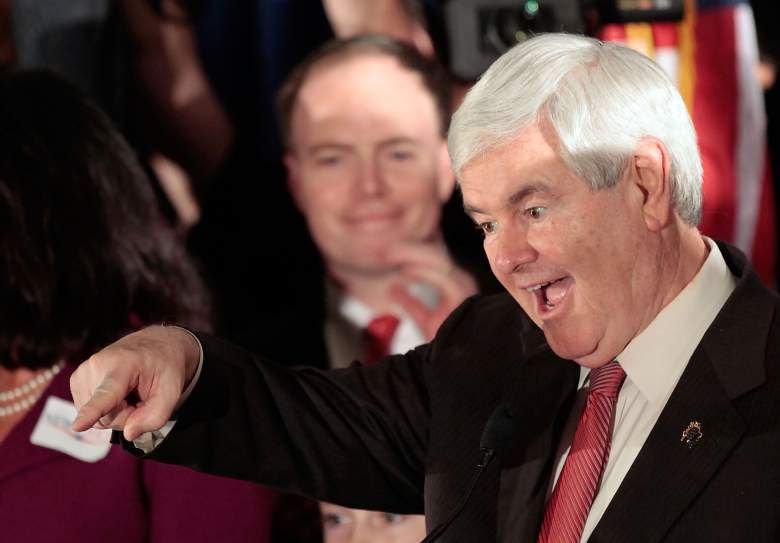
Newt Gingrich was in a celebratory mood after winning the South Carolina GOP primary on January 21, 2012. But it turned out to be the former House speaker’s only primary win. (Getty)
Newt Gingrich, who came out of political retirement to run for the GOP nomination in 2012, is the exception to the rule that South Carolina winners go on to become GOP nominees.
Gingrich, who served as Speaker of the House from 1995 to 1999 and is from nearby Georgia, won 40 percent of the South Carolina vote in 2012, beating Romney by 12 percentage points. But Gingrich’s success was short-lived. Romney cruised to victory 10 days later in Florida, getting 46 percent of the vote to Gingrich’s 32 percent and eventually cruising to the nomination.
Gingrich won the primary in his home state of Georgia on March 3, but that was his only other victory of the campaign.
5. Marco Rubio & Jeb Bush Each Have the Endorsement of 1 of South Carolina’s U.S. Senators
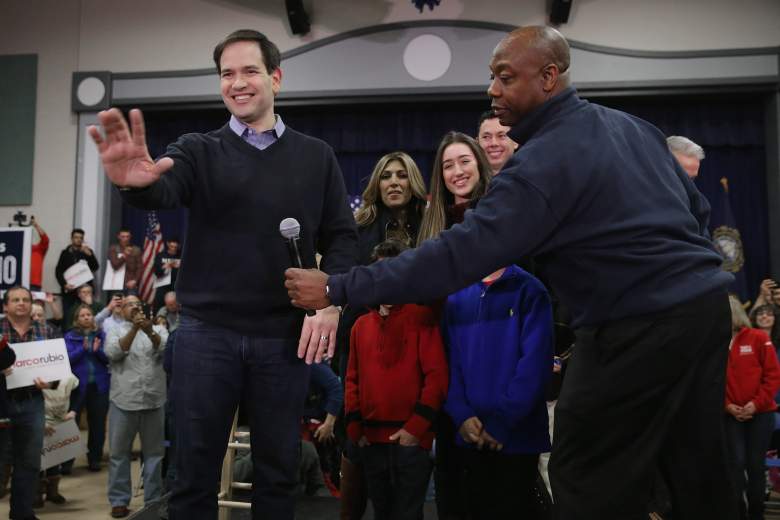
Senator Tim Scott of South Carolina (right), pictured at a February 5 Marco Rubio rally in Derry, New Hampshire, announced the day after the Iowa caucus that he was endorsing Rubio. Lindsey Graham, the state’s other U.S. senator, is supporting Jeb Bush. (Getty)
South Carolina’s two GOP senators have been among the first to endorse candidates. Lindsey Graham, the state’s senior senator, endorsed Jeb Bush after Graham dropped out of the race in January. Tim Scott, the state’s junior senator, announced February 2 that he was endorsing Rubio.
Trey Gowdy, the influential South Carolina GOP congressman who chairs the House’s Select Committee on Benghazi, is also aboard the Rubio bandwagon.
Nikki Haley, the state’s two-term GOP governor, has not endorsed a candidate.
Correction: A previous version of this post incorrectly stated the number of delegates automatically awarded to the winner of the South Carolina primary. The winner gets at least 29 delegates, with the other delegates determined by the winners in each of the state’s seven congressional districts.

